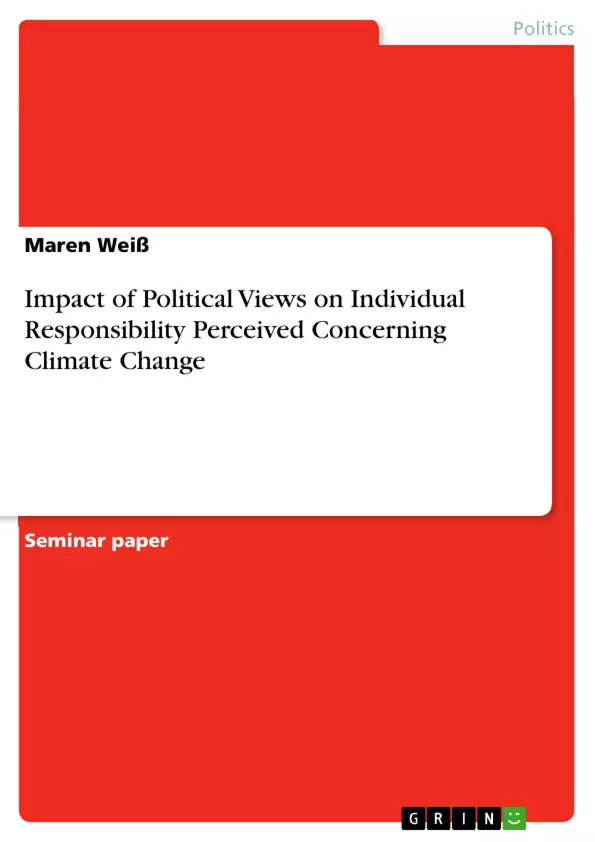This research paper deals with the current issue of the global climate crisis and the personal responsibility to act against it. It investigates how the amount of the consumption of political news can help to gain a greater individual responsibility to try to reduce the impact of climate change. Accordingly, this research paper hypothesizes a positive relationship between political news consumption and the individual responsibility to climate change. Through applying multivariate OLS-regressions to a sample of German citizens of the European Social Survey dataset from 2016, the hypothesized relationship can also be observed empirically. A gap regarding the personal responsibility to climate change between people who do consume political news and people who ignore political news can be identified. Based on these results, clear policy implications can be developed to raise the amount of political news consumption for news ignorers to broaden the extent of an individual's responsibility to act against climate change and to develop remedies against this collective action problem.
Inhaltsverzeichnis (Table of Contents)
- Climate crises and political news: an introduction
- How does political news consumption influence the individual responsibility to climate change? Theory and hypothesis
- An empirical analysis on the relationship between political news consumption and the individual responsibility to climate change
- Description of the data
- Operationalisation
- Method
- Descriptive analysis
- Analysis of the results
- To what extent does the consumption of political news influence the individual responsibility to climate change? Discussion and conclusion
- References
- Appendix
- Appendix A - Tables
- Appendix B - Graphs
Zielsetzung und Themenschwerpunkte (Objectives and Key Themes)
This research paper examines the connection between political news consumption and individual responsibility to combat climate change. It hypothesizes a positive relationship between the two, meaning that greater exposure to political news regarding climate change can lead to increased personal responsibility for environmental action. The study seeks to identify and quantify this relationship using statistical analysis on a sample of German citizens.
- The impact of political news consumption on individual responsibility towards climate change.
- The role of political knowledge in shaping attitudes towards climate change.
- The influence of socio-economic factors on individual responsibility to climate change.
- The potential for political news consumption to address the collective action problem of climate change.
- Policy implications for promoting individual responsibility towards climate change.
Zusammenfassung der Kapitel (Chapter Summaries)
- Chapter 1 introduces the topic of climate change and political news consumption, highlighting the growing urgency and global impact of climate crisis. It introduces the research question: "To what extent does the consumption of political news influence the individual responsibility to climate change?"
- Chapter 2 defines the key concept of "responsibility to climate change" and explores the theoretical relationship between political news consumption and an individual's sense of responsibility. It discusses the collective action problem of climate change and proposes that political news consumption can be a key factor in motivating individual action.
- Chapter 3 details the empirical analysis of the relationship between political news consumption and individual responsibility to climate change. It describes the dataset used, operationalisation, method, and presents descriptive analysis of the data before analyzing the results.
Schlüsselwörter (Keywords)
Climate change, political news consumption, individual responsibility, collective action problem, political knowledge, environmental action, socio-economic factors, policy implications, multivariate OLS-regression, European Social Survey, Germany.
Frequently Asked Questions
Does watching political news make people feel more responsible for climate change?
Yes, the research identifies a positive relationship between higher political news consumption and an increased sense of individual responsibility to act against climate change.
What data was used for this study?
The analysis used multivariate OLS-regressions based on the 2016 European Social Survey dataset of German citizens.
What is the "collective action problem" in climate change?
It refers to the challenge where individuals may feel their personal actions don't matter, though collective change is necessary. Political news can help bridge this gap.
What are "news ignorers"?
These are individuals who consume very little to no political news. The study suggests they often feel less personal responsibility regarding environmental issues.
What are the policy implications of this research?
The paper suggests that increasing political news consumption could be a key strategy to broaden environmental responsibility among the public.
- Arbeit zitieren
- Maren Weiß (Autor:in), 2020, Impact of Political Views on Individual Responsibility Perceived Concerning Climate Change, München, GRIN Verlag, https://www.grin.com/document/1127981



